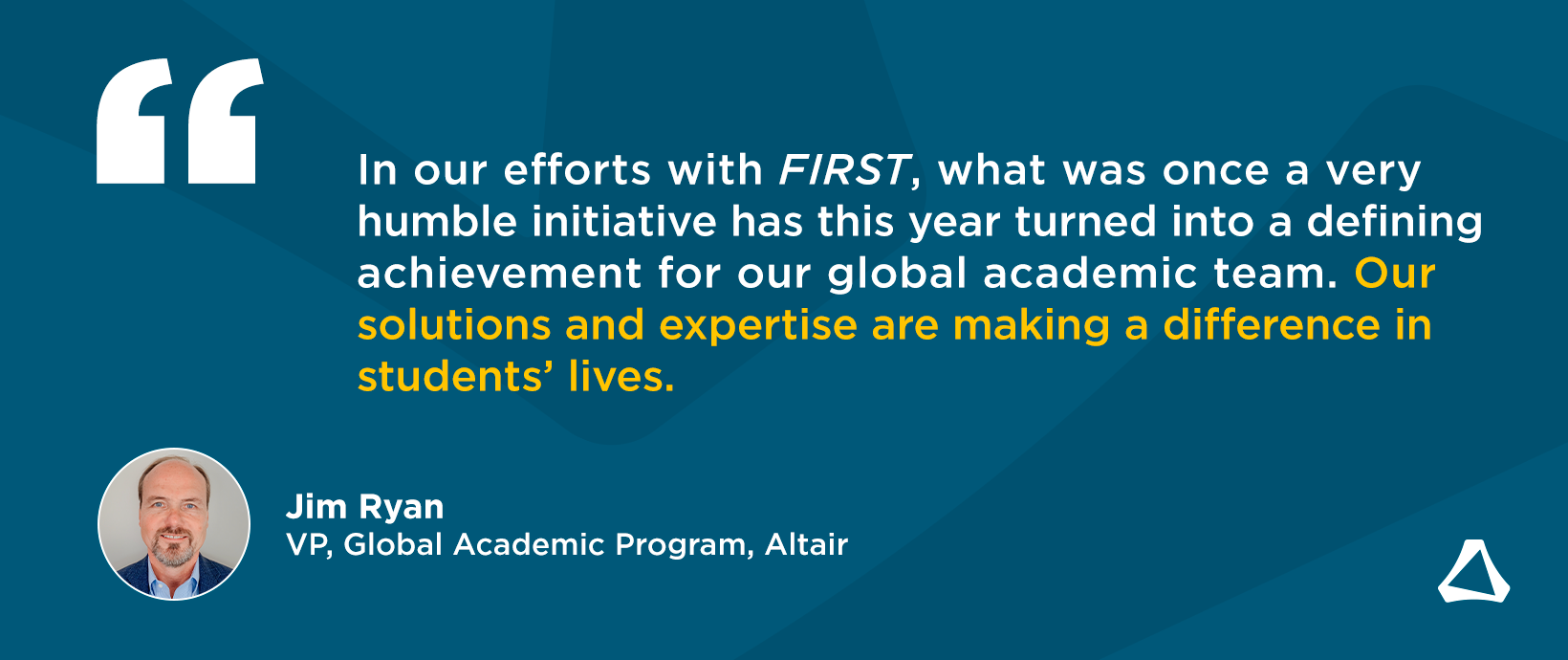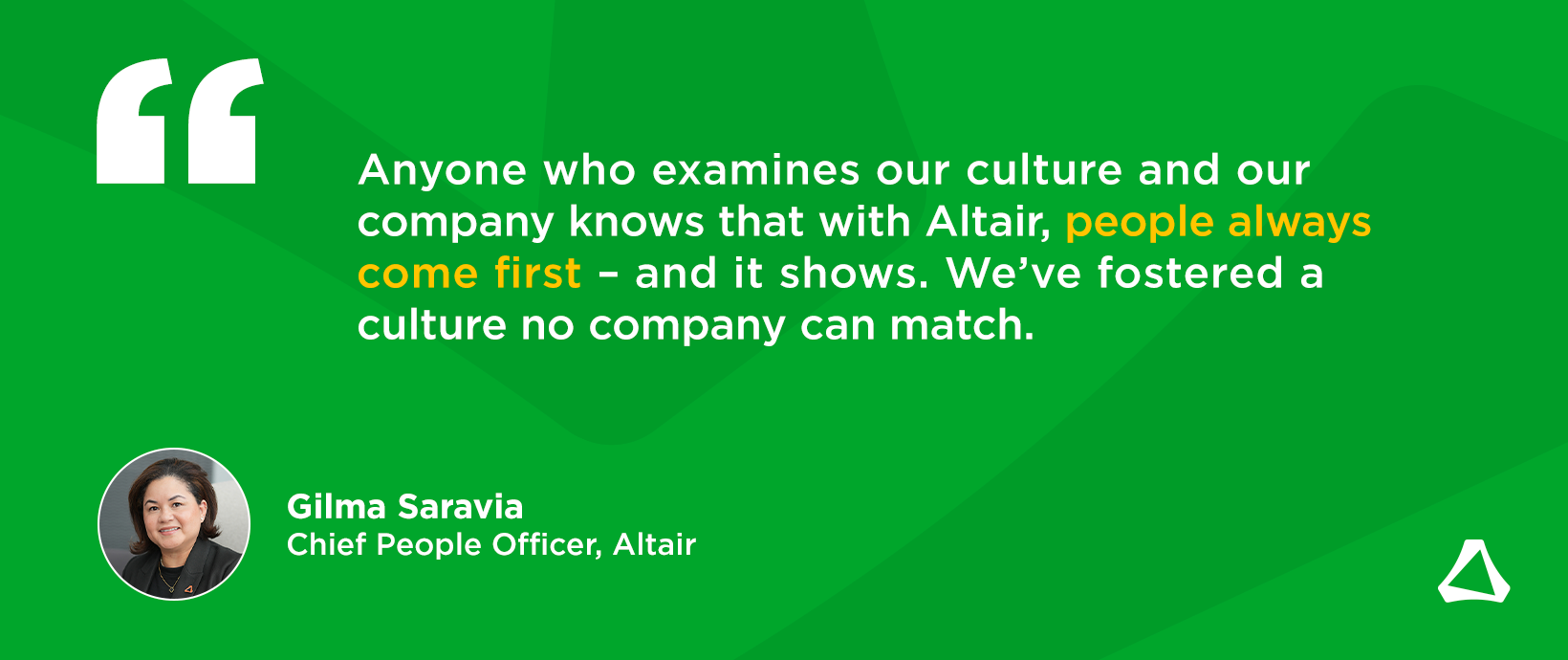Convergence Isn't Limited to Technology

Here at Altair, it’s no secret that we like the idea of convergence. It’s what we’re known for, and what we do best. Even when simulation, artificial intelligence (AI), machine learning (ML), and high-performance computing (HPC) were in their infancy, we realized these technologies were better off together. As we’ve grown, we’ve seen these once-disparate fields blend and intertwine in ways expected and unexpected. We are proud to have been at the forefront, always pushing the boundaries and redefining what’s possible through our vision, our technology, and our determination.
And while we specialize in the convergence of simulation, AI, and HPC, we know there’s one thing these fields have in common – data. In modern life, data is everywhere you look, used by industries and organizations around the world in ways we could’ve never dreamed of mere decades ago. Data is serious business; handling vast quantities of data and knowing how to efficiently organize, categorize, and interpret it is daunting and requires experts equipped with the right tools and knowledge. Data science isn’t a new field – but the way data is used today is a far cry from how it was used in the past. That’s why today’s engineers must also have a broad, multi-faceted toolkit. Increasingly, they’re dealing with data in every experiment, in every design. Going forward, engineers will only get closer and more involved with data. That’s why we are already seeing another instance of convergence: The convergence of data science and engineering.
The Right Skillset
It’s easy to stereotype the skillsets that people need when they work in certain professions – engineering is no exception. Engineers are curious, methodical, and thrive when they’re solving problems. It’d be hard to be an engineer if you weren’t attuned to the finer details of experiments and designs. Furthermore, why would an engineer want to solve a problem if they weren’t curious about it, if they weren’t interested in finding a way to improve a product or process? The field of data science requires many of these same qualities, which is why engineers are the perfect people to embrace it.
In fact, engineers should be ecstatic about the possibilities data science promises. Modern engineering and data science solutions give engineers more access to data than ever before; these solutions also give them higher-quality, more detailed data. For engineers, it makes sense to get comfortable working with data so they can design better experiments, build better products, glean more valuable insight, and continue pushing the boundaries of what’s possible. Technology doesn’t slow down – indeed, the engineering and data science landscape is shifting and changing as we speak.
Evolving Technology
Engineers from antiquity to the present day have accomplished magnificent things. Naturally, the tools and skills needed to be a great engineer have evolved throughout time. The same logic holds true today. Simulation tools have become powerhouse software solutions, and they continue to advance; they are gathering more data and implementing new techniques that offer faster, more accurate insights. AI and ML are driving the tools forward, augmenting existing algorithms and, occasionally, rewriting them altogether so they become more accurate and more reliable. In fact, the tools that utilize AI and ML are taking advantage of a technology that “learns” the way our brains do – by absorbing past information and using it to make better future decisions. Because computers can take in staggering amounts of data, it doesn’t take long for the algorithms to get great at what they do.
But there’s always challenges when technology grows rapidly the way AI and ML have. For starters, many organizations and industries don’t realize how AI and ML can benefit them. I concede that sometimes, advanced technology doesn’t catch on right away because business-oriented people don’t realize how tools “meant just for engineering” can have uses outside of engineering, though maybe that’s the engineer in me speaking.
Additionally, even when organizations are eager to adopt AI and ML technology, they often struggle answering a basic question: Where do we start? There are countless tools and algorithms that specialize in countless things; but thankfully, engineers are the perfect people to turn to. Just as you wouldn’t want to use a fork to eat soup, you wouldn’t want to use a general-purpose fluid dynamics simulation tool to test how wind affects a skyscraper. Like utensils, simulation tools specialize in different things. The key is picking the right tool for the job. Most of the time, nobody will have a better grasp on what the job needs than the engineers responsible for solving problems and interpreting data day-in and day-out. As simulation, data science, AI, and ML technology continue their rapid ascent, engineers should be at the forefront – they are the ones who have ideal combination of skillset, domain expertise, and experience that can bring the puzzle pieces into place.
The Future of Engineering and Data Science
I mentioned earlier the way we use simulation and data today would’ve been mind-blowing, perhaps inconceivable a few decades ago. Likewise, we can expect the way we use those tools today to evolve in the coming decades. Even today, simulation tools are merging to include low code/no code data analytics capabilities. In modern solutions, it’s difficult to determine where the “engineering” aspects stop and where the “data” aspects begin. As such, I predict we will see the rise of the engineer-data scientist.
Of course, for those who’d rather focus more on one area of engineering or data science than the other, that option will still be available. But I anticipate (and hope) that tomorrow’s industry experts will have the domain knowledge and the engineering-data science toolkit that will allow them to embrace and excel in both engineering and data science. Tomorrow’s engineer-data scientists must be able to navigate simulation software, understand basic AI and ML concepts, and they must be comfortable gathering, organizing, storing, and interpreting heaps of data that tomorrow’s tools will generate. In essence, they must break free from existing knowledge silos and become well-rounded, robust experts.
The engineer-data scientists’ emergence will be revolutionary for the industry, but more importantly, it will be exciting and useful to industry outsiders and laypeople alike. We all benefit from people who can navigate modern technology in new, never-before-seen ways. After all, modern computing breeds virtuous cycles – good simulation breeds better simulation, good data breeds better data, good mentors guide better mentors, and so forth. With today’s engineering and data science technology, powered by AI and ML technology, we can provide better products, we can glean better insights, and we can better understand and design the world around us. I don’t envision the convergence of engineering and data science as something to fear; today’s brilliant engineers and data scientists aren’t going to lose their jobs or be replaced, because the world needs all its brilliant analytical minds. Rather, it represents a magnificent opportunity, a way to reduce costs, reduce waste, reduce wasted time, reduce our environmental impact, improve user experience, improve safety, and so on. And I’m certain it will have positive impacts we can’t even imagine today.
The future is never quite what we expect. But today’s technology and tomorrow’s innovative minds can create brilliant products and astounding methods that can make life safer, greener, and better. I look forward to the days where engineering and data science are inseparable because I know that it will mean that we have innovated, that we dared to improve.
To learn more about engineering and data science, watch our webinar on the topic here. Additionally, I was recently interviewed by SME Media about the rise of the engineer-data scientist on their podcast, which you can listen to here.




